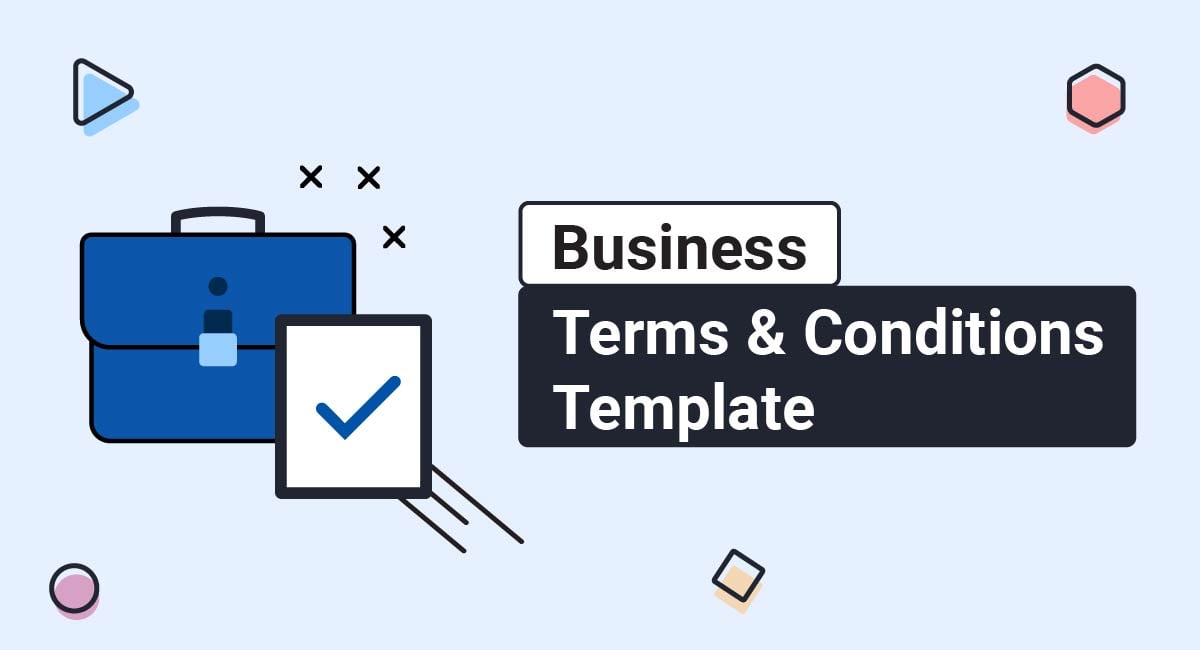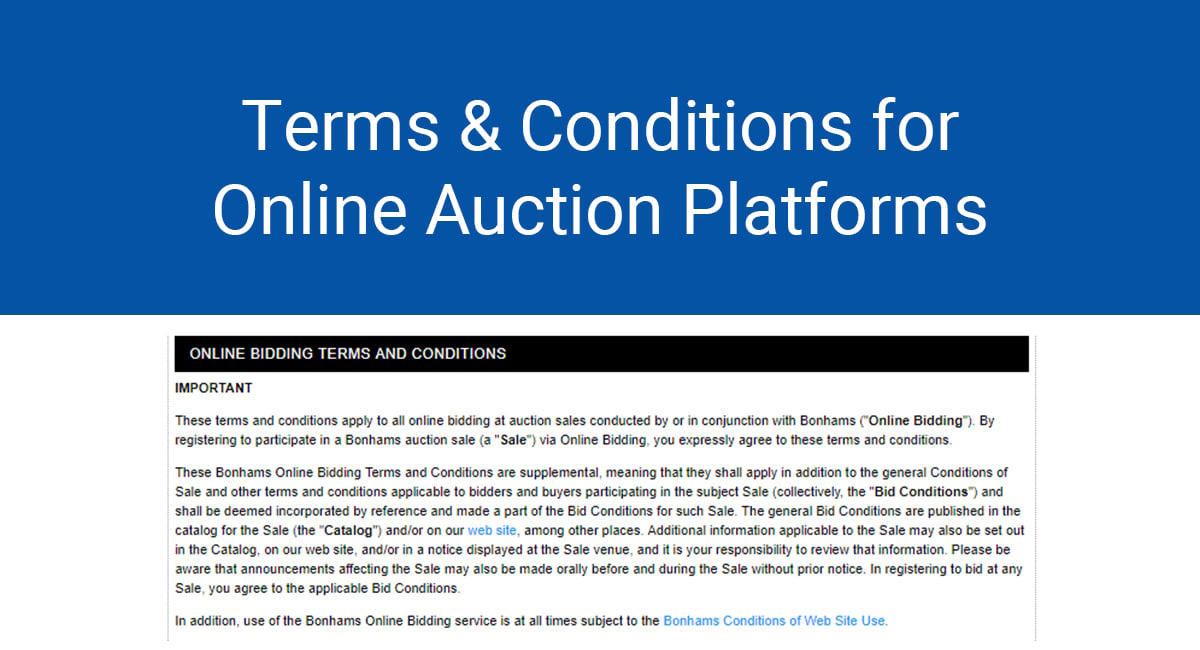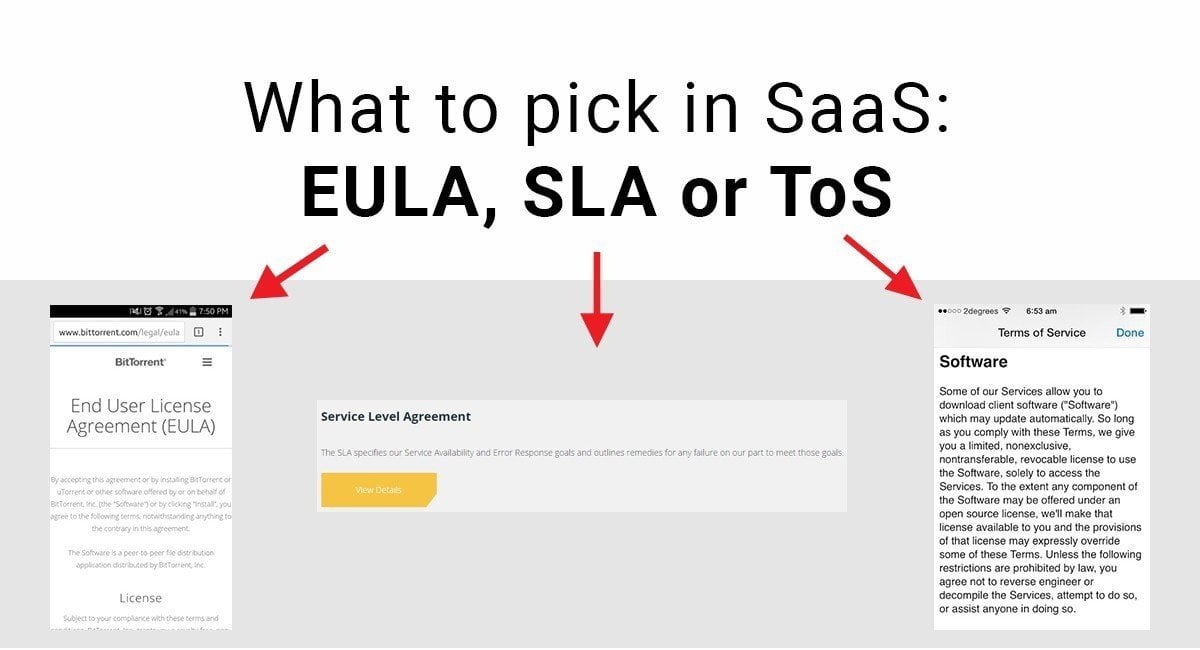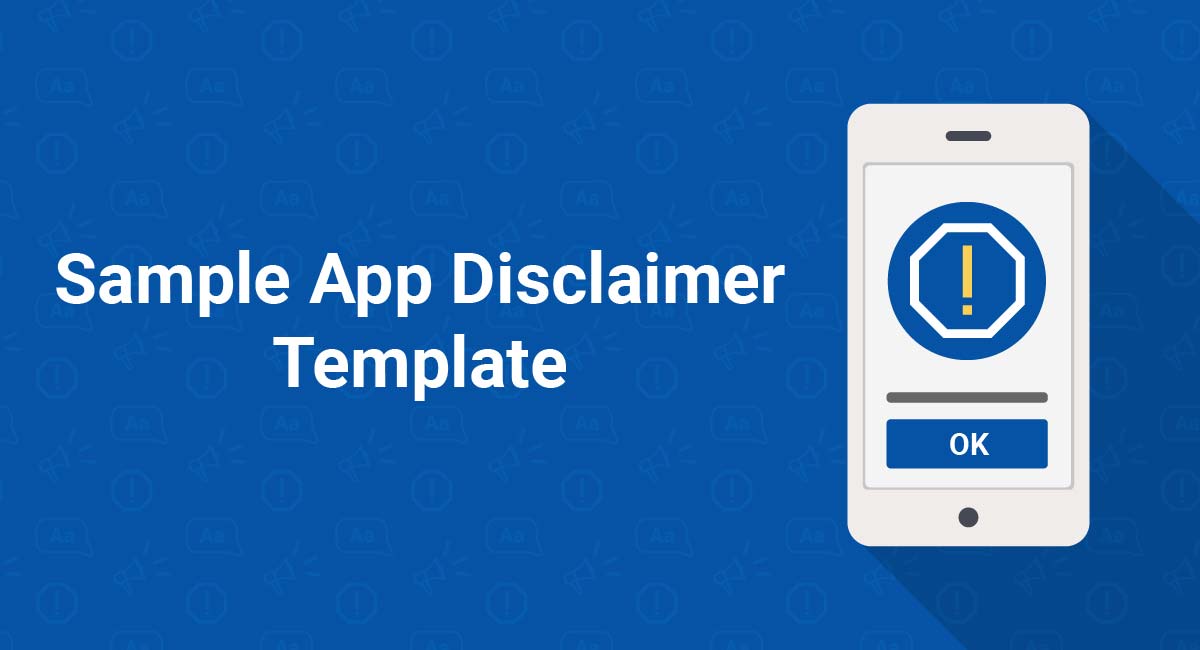A Terms & Conditions (T&C) agreement can greatly benefit a small business by helping the business owner set out the rules for your products and services and help manage the expectations for you and your customers.
This type of agreement is also known as Terms of Use or Terms of Service, is an important agreement for all businesses, including small businesses.
This article will get you started with creating your own custom Terms and Conditions agreement for your small business. We've also put together a Small Business Terms and Conditions Template that you can use to help write your own.
Our Terms and Conditions Generator makes it easy to create a Terms and Conditions agreement for your business. Just follow these steps:
-
At Step 1, select the Website option or the App option or both.
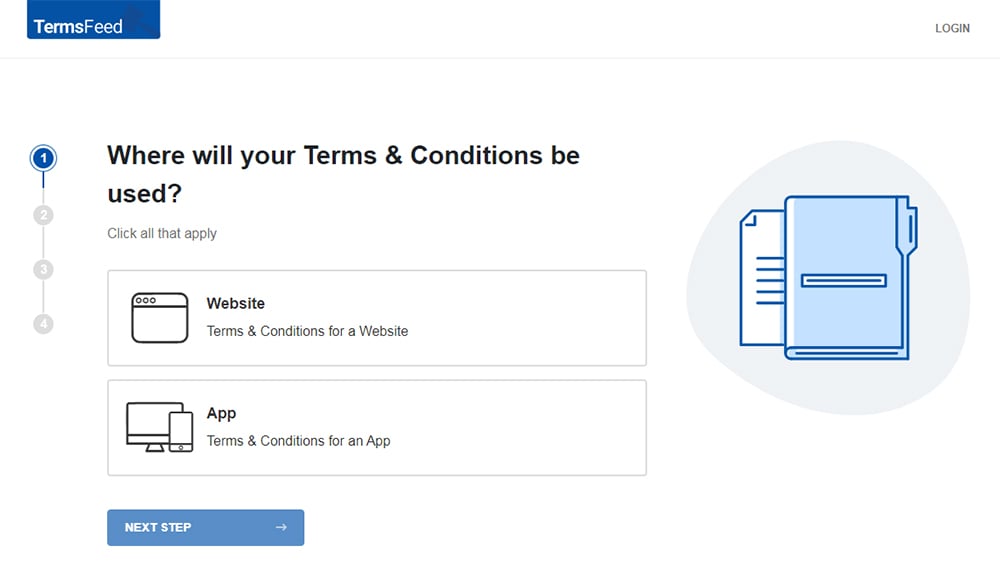
-
Answer some questions about your website or app.
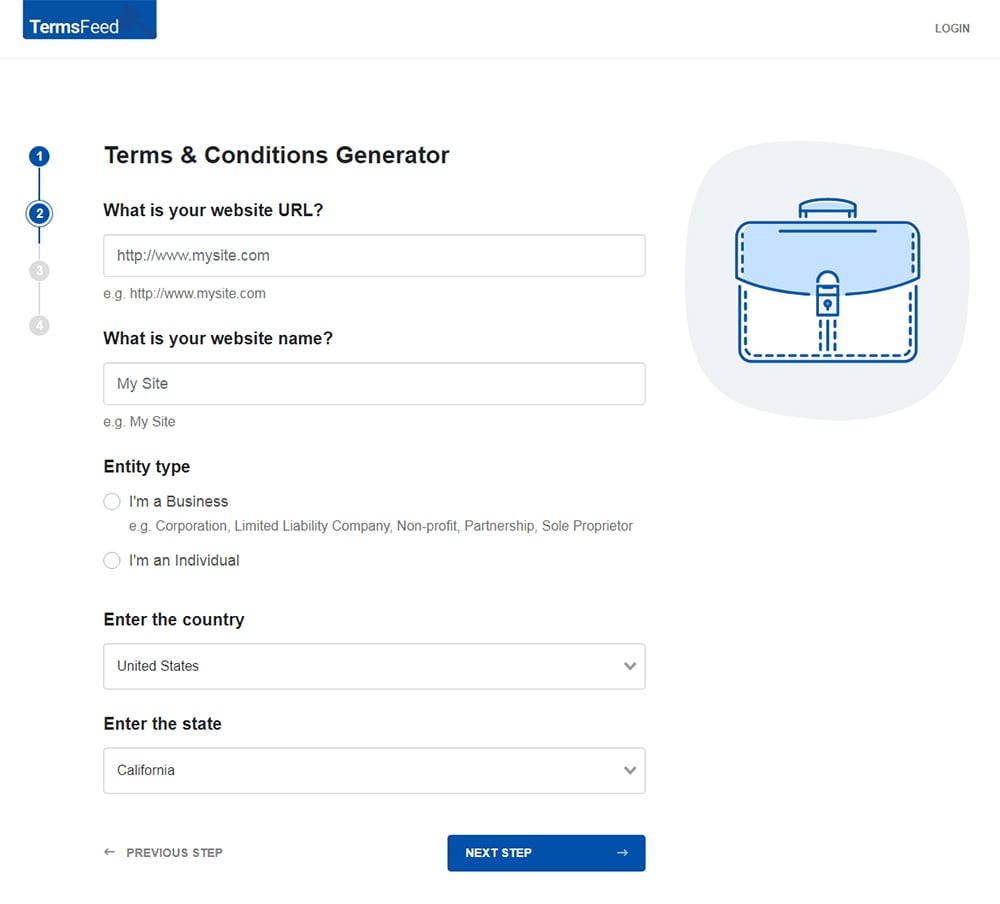
-
Answer some questions about your business.
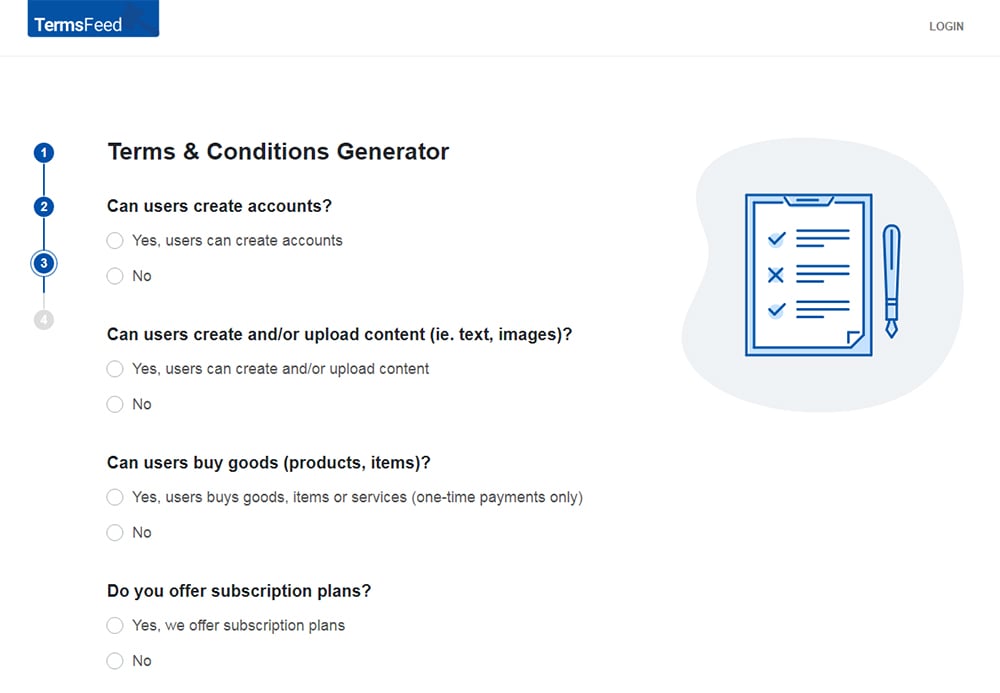
-
Enter the email address where you'd like the T&C delivered and click "Generate."
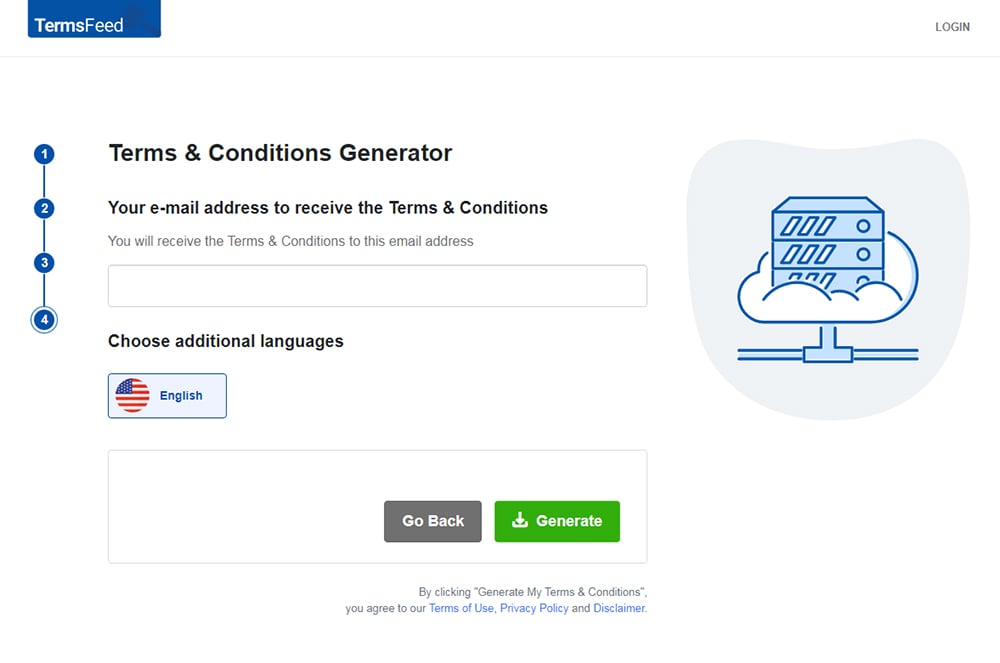
You'll be able to instantly access and download the Terms & Conditions agreement.
- 1. What is a Terms and Conditions Agreement for a Small Business?
- 2. Why Do You Need Terms and Conditions Agreement for Your Small Business?
- 2.1. Assure Cash Flow
- 2.2. Mutual Understanding
- 3. How to Create a Terms and Conditions Agreement for Your Small Business
- 3.1. Clear Description of Products or Services
- 3.2. Payment Terms
- 3.3. Warranties or Guarantees
- 3.4. Limitations of Liability
- 3.5. Return and Refund Policies
- 3.6. Delivery Timelines
- 3.7. Your Privacy Policy
- 3.8. Intellectual Property and Copyright
- 3.9. Terminating the Agreement
- 3.10. Governing Law
- 4. How to Display Your Small Business Terms and Conditions Agreement to Your Customers
- 5. How to Get Users to Agree to Your Small Business Terms and Conditions
- 6. Summary
- 7. Download Sample Small Business Terms and Conditions Template
- 7.1. Sample Small Business Terms and Conditions Template (HTML Text Download)
- 7.2. Sample Small Business Terms and Conditions Template (PDF Download)
- 7.3. Sample Small Business Terms and Conditions Template (Word DOCX Download)
- 7.4. Sample Small Business Terms and Conditions Template (Google Docs Download)
- 7.5. More T&Cs Templates
What is a Terms and Conditions Agreement for a Small Business?
A Terms and Conditions agreement is the contract that sets out rules for the relationship between a business and its customers. While it may contain general guidelines applicable to all customers, it may present details more specific to a particular customer - like prices and deadlines.
Here's an example of the table of contents of a standard Terms agreement so you can get an idea of what types of clauses, information and content one will include:
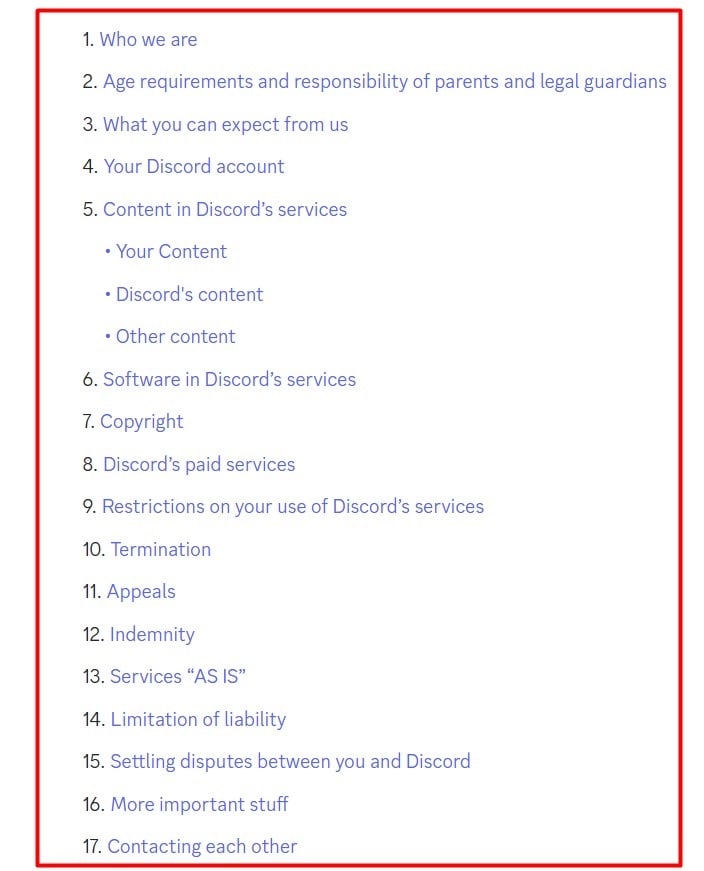
Why Do You Need Terms and Conditions Agreement for Your Small Business?
You need Terms and Conditions agreement for two main reasons:
- To assure your cash flow, and
- To encourage mutual understanding
Assure Cash Flow
Terms and Conditions agreements explain important details such as when a customer pays, how much, any late payment penalties, and collection costs if the matter escalates.
It is an unfortunate reality that when it comes to bill paying, smaller businesses end up at the bottom of the pile. You can strengthen your position with the right payment terms in your T&C.
This can include information about things such as prepayment deposits, monthly subscription costs, and even interest or penalties assessed on late payments. Without these items being addressed in a T&C, you cannot enforce these terms and may end up working hard or providing products without a guarantee of payment.
Mutual Understanding
If a client can review your Terms before purchasing your product or service, everyone enters the transaction informed. This prevents the misunderstandings that can lead to dispute resolution procedures later.
Misunderstanding is possible in all contractual relationships. Imagine the disaster if you expect to receive payment for materials before building a product but the customer believes payment is not due until delivery. If you do not have the prepayment terms in writing, it makes it difficult to enforce terms to your best interest.
The same is true with service or product quality, deadlines for completion or delivery, and returns and refunds.
Check out our Terms and Conditions FAQ for more information about these important agreements.
How to Create a Terms and Conditions Agreement for Your Small Business
Not all of the following provisions may be relevant to your business, but they are a good place to start when considering what you need for your T&C.
Clear Description of Products or Services
Every T&C between a business and its customers must include a description of the products and services offered. It can also include services that are not provided with a contract.
Planet Fitness defines its services as everything from its website and mobile application to services of subsidiaries and affiliates:

Generally, the smaller your business, the more specific you want to make your service or product descriptions. Besides giving the customer a good idea of what you will provide you also avoid being taken advantage of by a customer demanding additional services or products with the fees they paid. Avoiding this scenario is also beneficial to your bottom line.
Payment Terms
Your payment terms should include prices, terms of payment, interest or fees on late payments, returned check charges, and the cost of shipping, handling, freight, and returns.
Here's how Planet Fitness lays out information about its billing and fees structures:
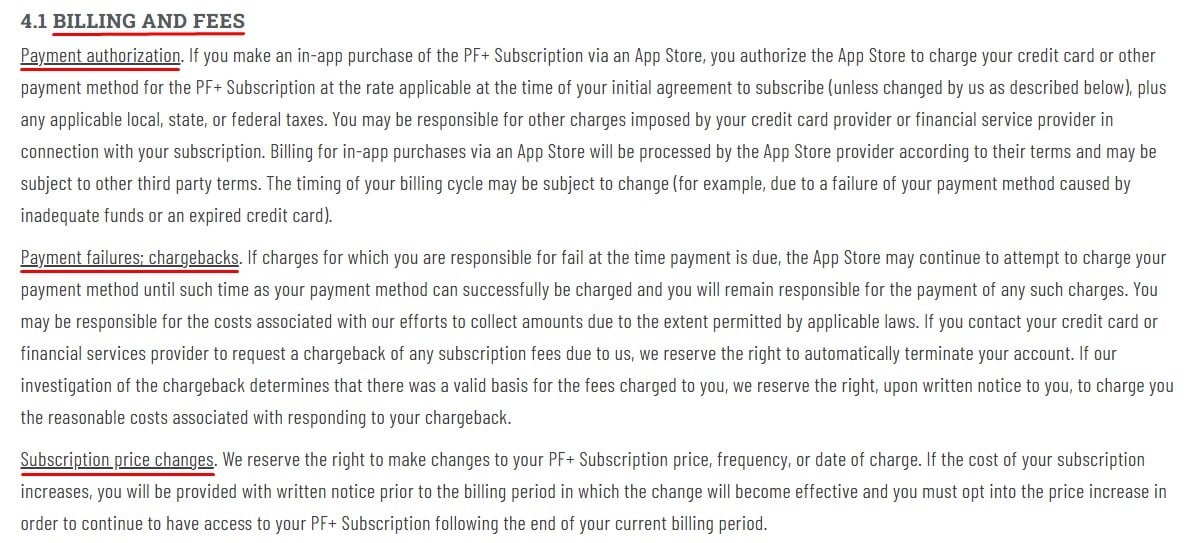
Warranties or Guarantees
A warranty or guarantee on your work offers reassurance, even if it is broad. If you are able to be specific on what is considered quality, note that in your T&C.
Warranties and guarantees should also contain time limits. You do not want a refund request five years after providing a product or service. Choose a timeline reasonable for your industry, like 30 days or even 12 months.
Here's how Steris breaks down the timeframe for its warranty, as well as what isn't covered by it:

Most of these clauses, similarly to the next one we'll cover, have general language, usually in all capital letters, that cover the topic generally. These are good statements to include for addressing liability issues.
Limitations of Liability
Your Terms agreement is where you can limit your liability and avoid potential legal claims against you for a variety of things. Including a fairly standard clause addressing this is a great addition to any Terms agreement.
Here's how Steris does this:

It is also possible to limit liability and offer a guarantee. If a product fails, it is only reasonable to provide a replacement or refund. However, if you do not properly advise of risks or take reasonable precautions to keep people from getting hurt, it is unlikely a liability limitation will work in your favor. So, make the effort to have policies to back it up.
Return and Refund Policies
Retail establishments normally maintain separate Return and Refund Policies. Ecommerce sites usually give this policy its own webpage.
If you sell products online, you can place these policies in your T&C as well. This will typically be done in a fairly short summary clause or statement that then links to the entire Return and Refund Policy.
However, if your return policy is short enough (such as "no returns or refunds"), you can include the complete information within your Terms and Conditions agreement without linking to a separate policy.
Here's an example from Planet Fitness of a Terms and Conditions clause that encompasses the entire return and refund policy:

Here's an example of a more robust Terms and Conditions clause that addresses refunds and links to a separate Refund Policy:
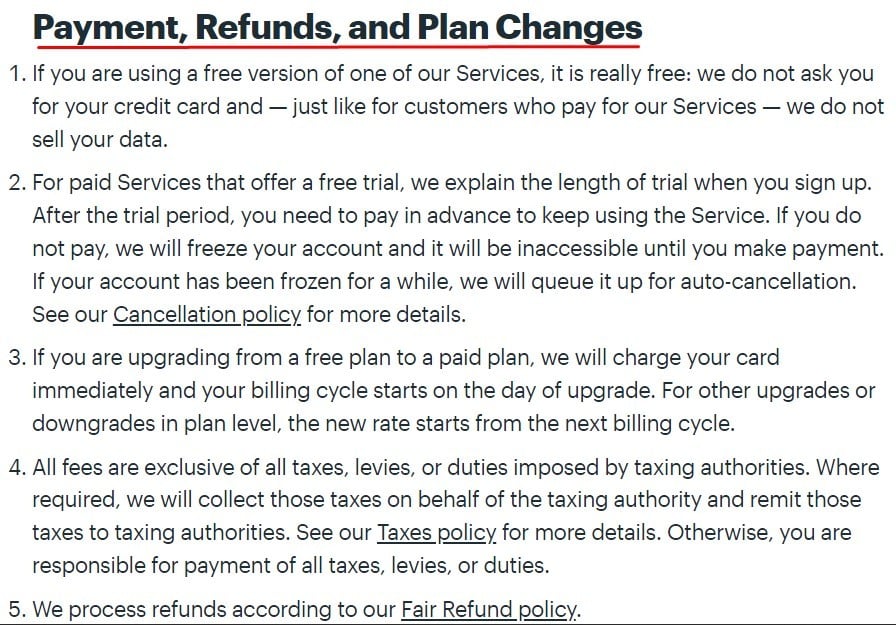
You can use the TermsFeed Return and Refund Policy Generator to create your own policy.
Delivery Timelines
This clause can be very basic or very complex depending on the nature of your delivery processes.
Timelines will depend on the nature of your product. Services have deadlines and goods have expected dates of delivery.
Here's an example of a very thorough clause from Knauf Insulation:
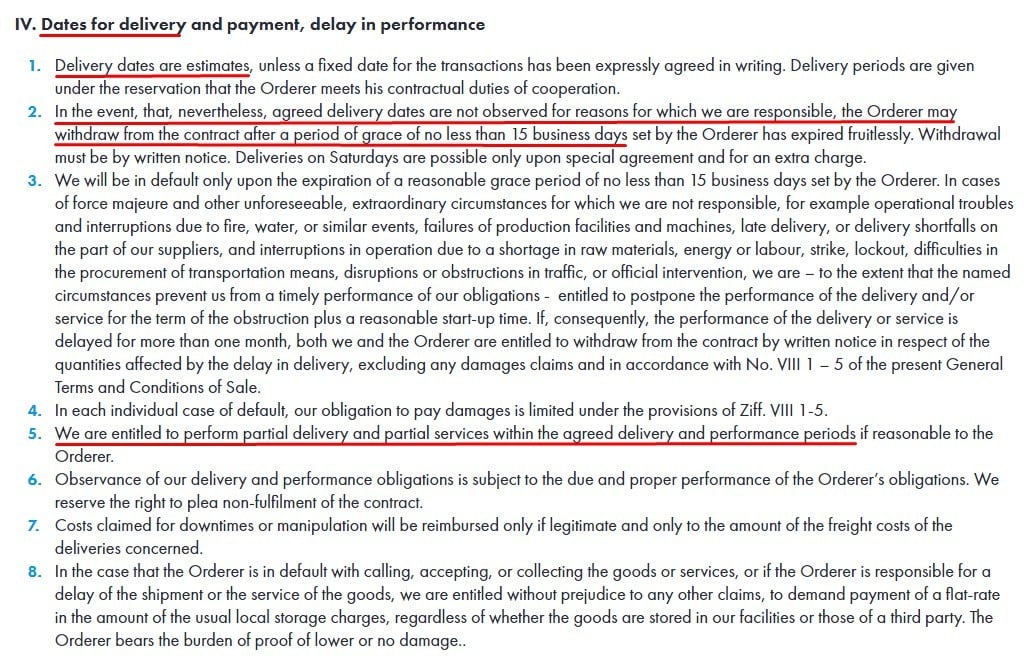
If your customer insists on a deadline, be careful that you agree on one that you will actually meet. Never choose an unreasonable deadline or delivery time that is impossible to meet with your resources.
Your Privacy Policy
If you handle personally identifiable information, you need to have a Privacy Policy. It is still recommended and helpful to reference privacy or confidentiality in your T&C, but you'll still need a separate Privacy Policy as well.
Here's how Planet Fitness notes its Privacy Policy within its Terms of Use and links to the complete policy:

This section does not have to be long. At the very least, provide a link to your Privacy Policy and note that it exists.
Intellectual Property and Copyright
This clause will help you protect the branding aspects of your business that make you unique. For example, your brand logo, pictures of your products, and any other creative material you share.
Here's an example of how to note that a website content, copyrights, patents trademarks and other intellectual property belongs to a business:
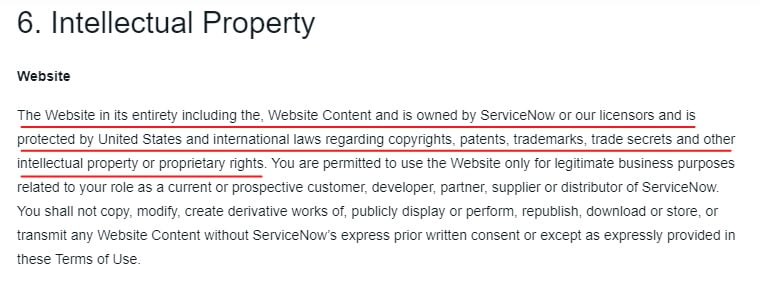
These clauses tend to be fairly standard and just need to communicate that your IP and copyrighted material is yours and that others cannot use it freely.
Terminating the Agreement
Termination clauses describe how the relationship outlined in the T&C may end. It generally states this occurs by mutual agreement or if one party gives notice of termination.
Some companies have exact procedures in place for how a termination will occur.
Here's an example of this type of clause:

And here's an example of a more robust, detailed clause that outlines a number of different scenarios that will trigger or call for termination:
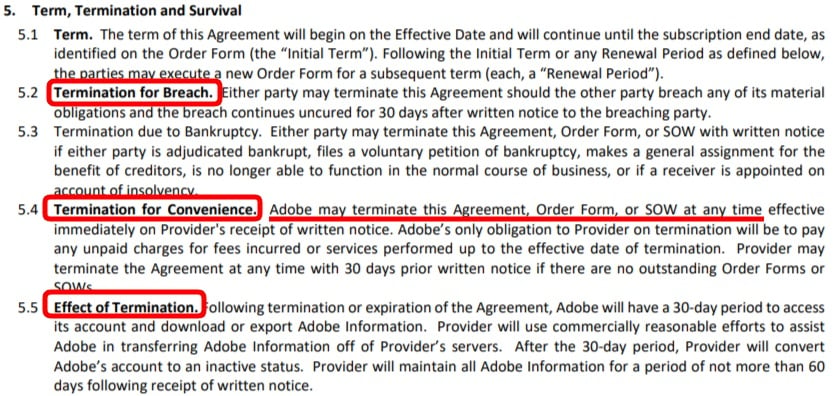
Governing Law
If you sell a product that you ship across the country or even overseas, it is likely you want disputes settled close to home. The only way to guarantee this is to limit the jurisdiction where customers can bring complaints.
Here's an example of this type of clause:
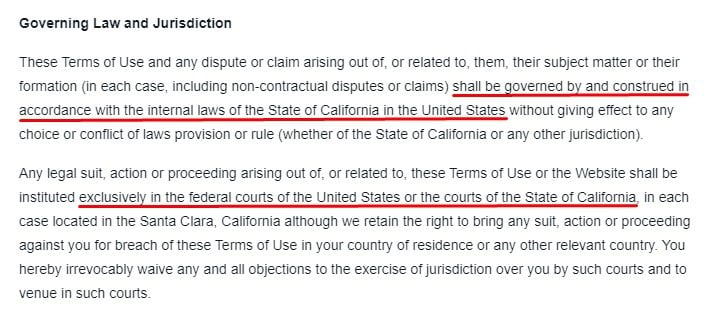
Now that you have an idea of what clauses to include in your Terms and Conditions agreement, let's look at how to display the agreement to your small business customers.
How to Display Your Small Business Terms and Conditions Agreement to Your Customers
First, you should always include a link to your agreement within your website's footer. This is a place where people know to look for important legal agreements and links. And, it will be available from every page of your website for ultimate accessibility.
Here's an example of this:
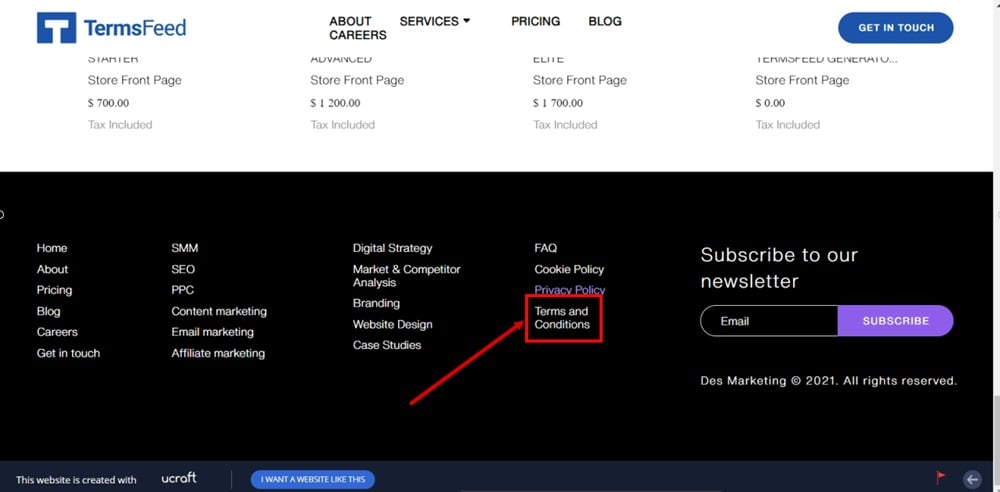
If you give the option to schedule services or order products through your website, present the T&C as part of that process.
Here's an example of this:

Provide a link to your Terms agreement at the point where users create an account if applicable. This ensures that they know what the terms of their account will be.
Here's an example:
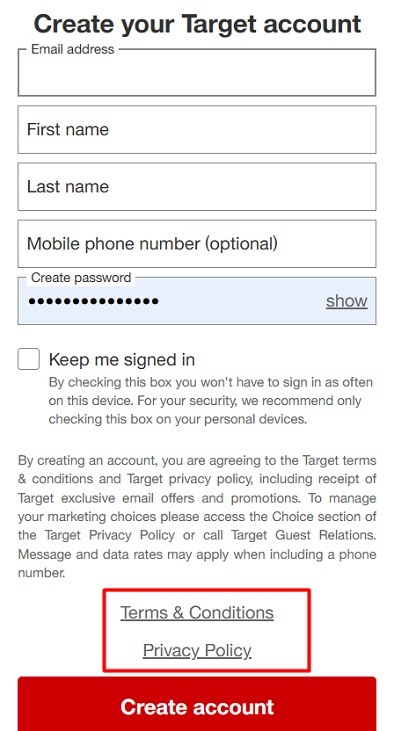
How to Get Users to Agree to Your Small Business Terms and Conditions
Consider adding a checkbox and an "I Agree" statement along with the link to your Terms so you can get users to clearly agree to them.
This is known as clickwrap and it is a popular way of assuring acceptance of agreements with web sites and apps. It works well for these purposes too if you allow people to purchase your product or service online.
Here's an example of this:
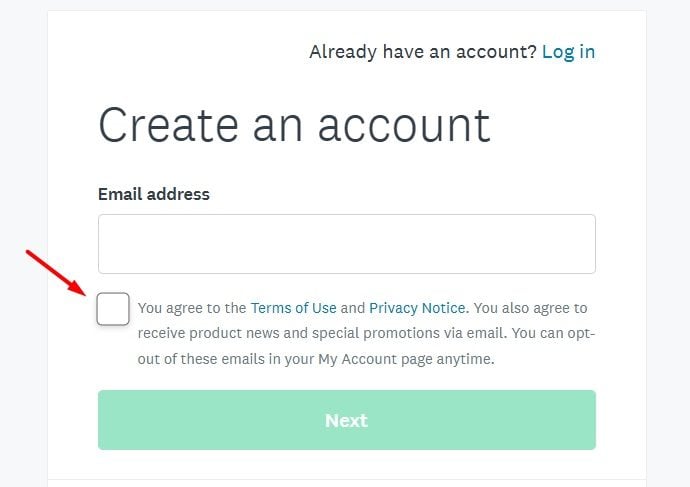
Here's another example from H. Samuel:
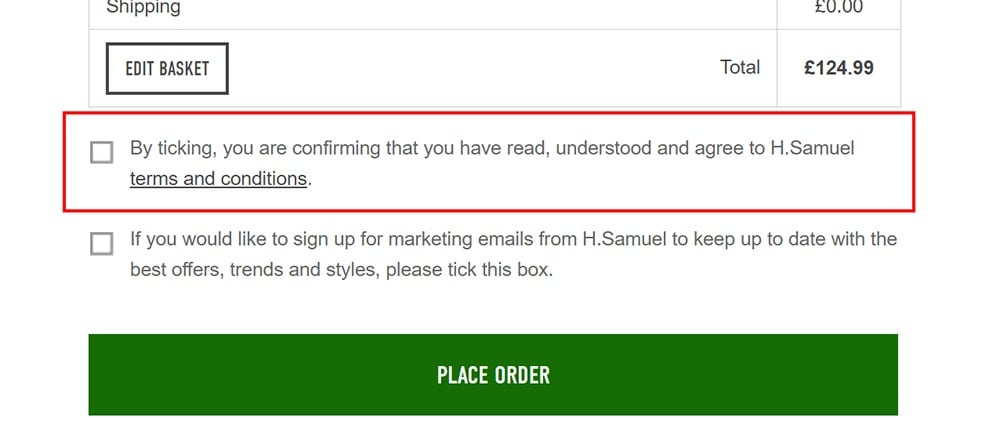
Summary
When you draft a Terms and Conditions agreement for your business, you need the correct provisions but also the right mindset. This agreement exists to preserve your business under the worst developments. You need to draft it to offer that protection.
You can do that by following these tips:
- Never assume "one size fits all." If you run a clothing boutique and your friend maintains a fitness studio, is it unlikely their T&C will work for you. You need to go beyond cut and paste or borrowing another agreement and customize this for you. It is okay to use other T&C agreements as templates if you need help getting started but never assume that what works for someone else will work for you.
- Imagine the worst case scenario. Think of the worst customer and anything that can possibly go wrong. Draft your T&C to deal with those situations.
- Be presentable. Avoid small fonts and use paragraphs rather than long blocks of solid text. Even if this makes your T&C several pages long, at least it will be easy to read. Use simple vocabulary and avoid complex legal jargon. An incomprehensible T&C will not endear you to your customers.
- Get feedback. Put yourself in the position of your customer and read the T&C from their viewpoint. Have a friend or other layperson review the T&C to see if they understand it clearly. This helps you draft a clear agreement.
- Be consistent. If your industry depends on key commercial and trade terms, use them. If they are obscure or technical, define them in your agreement. That will actually place you in a stronger position as it reduces misunderstanding.
A good Terms and Conditions agreement is the best time investment you can make for your small business. Give this task time and serious consideration so you secure the best legal protection possible.
Download Sample Small Business Terms and Conditions Template
Generate Terms & Conditions in just a few minutes
This free Sample Small Business Terms and Conditions Template is available for download and includes these sections:
- Introduction
- Definitions
- Acknowledgment
- Copyright Policy
- Intellectual Property
- User Feedback
- Links to Other Websites
- Termination
- Limitation of Liability
- "AS IS" and "AS AVAILABLE" Disclaimer
- Governing Law
- Disputes Resolution
- Severability and Waiver
- Changes
- Contact Information
Sample Small Business Terms and Conditions Template (HTML Text Download)
You can download the Sample Small Business Terms and Conditions Template as HTML code below. Copy it from the box field below (right-click > Select All and then Copy-paste) and then paste it on your website pages.
Sample Small Business Terms and Conditions Template (PDF Download)
Download the Sample Small Business Terms & Conditions Template as a PDF file
Sample Small Business Terms and Conditions Template (Word DOCX Download)
Download the Sample Small Business Terms & Conditions Template as a Word DOCX file
Sample Small Business Terms and Conditions Template (Google Docs Download)
Download the Sample Small Business Terms & Conditions Template as a Google Docs Document
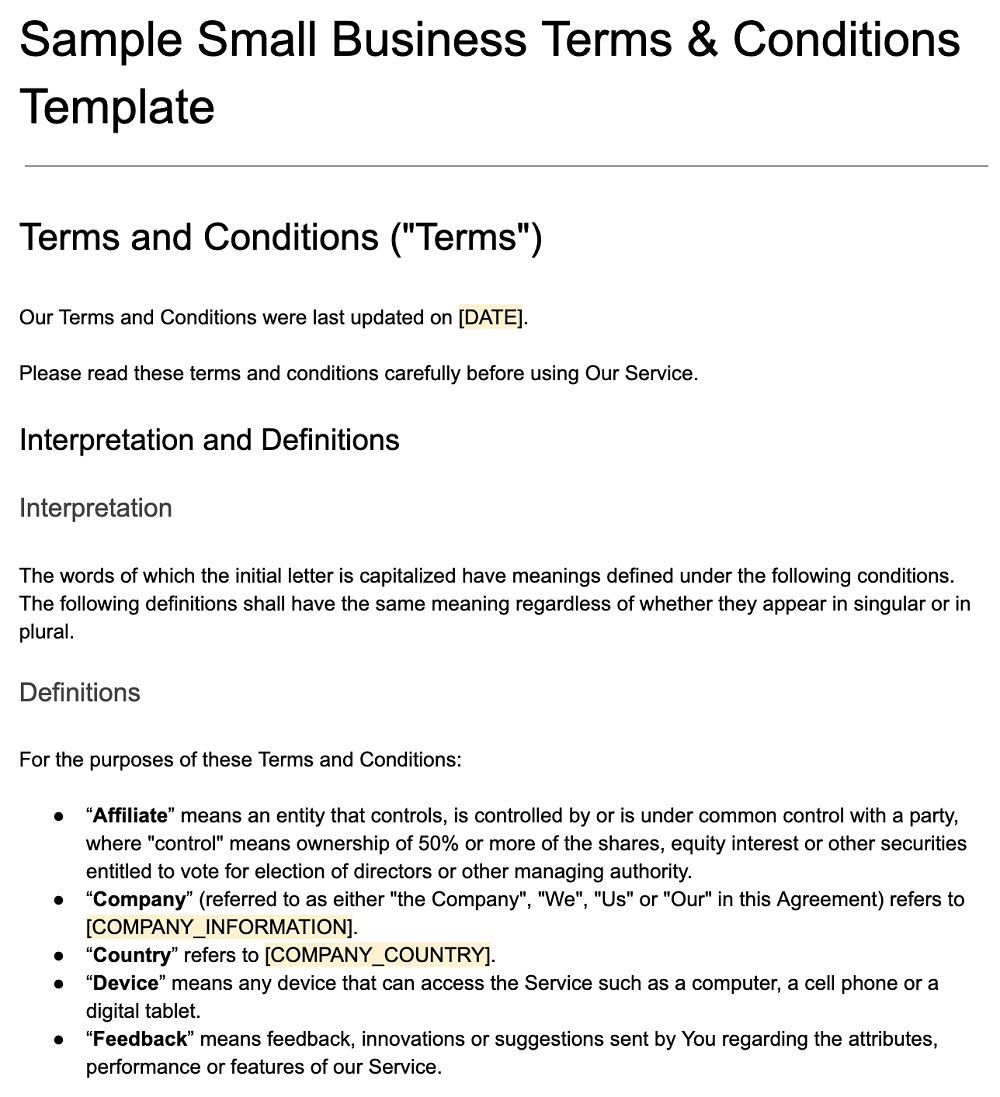
More T&Cs Templates
More specific T&Cs Templates are available on our blog.
| Sample Terms and Conditions Template | A Terms and Conditions agreement for all sorts of businesses. |
| Sample Mobile App Terms and Conditions Template | A Terms and Conditions agreement for mobile apps. |
| Sample SaaS Terms and Conditions Template | A Terms and Conditions agreement for your SaaS business. |
| Sample Ecommerce Terms & Conditions Template | A Terms and Conditions agreement for your Ecommerce Store. |
| Sample EULA Template | An End-User License Agreement for mobile apps. |

Comprehensive compliance starts with a Privacy Policy.
Comply with the law with our agreements, policies, and consent banners. Everything is included.
